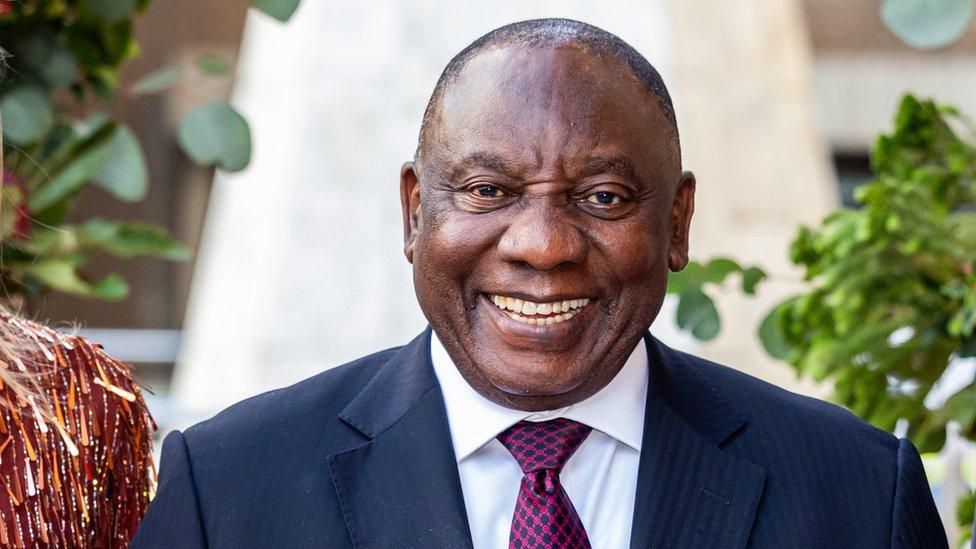South Africa's Jacob Zuma resigns after pressure from party
- Published
Mr Zuma said he was resigning "with immediate effect"
South Africa's embattled President Jacob Zuma has resigned after intense pressure from his own party.
In a televised statement he said he was quitting with immediate effect but said he disagreed with his ANC party's decision.
The ANC had told him to step down or face a vote of no confidence in parliament.
The 75-year-old has been facing calls to give way to Deputy President Cyril Ramaphosa, the ANC's new leader.
Mr Zuma, who has been in power since 2009, faces numerous allegations of corruption.
Earlier on Wednesday, police swooped on the Johannesburg home of the powerful and wealthy Gupta family with whom Mr Zuma has close ties.
How did Mr Zuma announce his resignation?
He began his speech by laughing and joking with members of the press, asking them why they looked so serious.
After paying tribute to those whom he had worked with over the years, Mr Zuma said that violence and division within the ANC had influenced his decision to step down.
"No life should be lost in my name and also the ANC should never be divided in my name. I have therefore come to the decision to resign as president of the republic with immediate effect," he said.
"Even though I disagree with the decision of the leadership of my organisation, I have always been a disciplined member of the ANC.
"As I leave I will continue to serve the people of South Africa as well as the ANC, the organisation I have served... all of my life."

'A very painful moment'
Analysis by Milton Nkosi, BBC News, Johannesburg
The resignation of president Jacob Zuma marks the end of an era. An era of one corruption allegation after another. An era of divisions, infighting and public squabbles. There are many people who are celebrating now, and not just from the opposition benches.
Some of President Zuma's fiercest political foes came from his own ANC party. Comrades who fought white minority rule in the same trenches as he did, could not wait to see his back. He is gone now.
There is a renewed sense of hope as Cyril Ramaphosa is taking over the reins of Africa's most industrialised economy. Some will miss him though, pointing to achievements like announcing free fees for higher education.
The ANC's Jesse Duarte summed up the mood for many supporters of Mr Zuma's when she said "this is a very painful moment".

The ANC (African National Congress) issued a statement saying Mr Zuma's resignation provided "certainty to the people of South Africa".
Deputy secretary general Jessie Duarte told reporters: "President Zuma remains a principled member of the ANC. The ANC wants to salute the outstanding contribution he has made."
Mr Zuma, a former member of the ANC's military wing in the days of apartheid, rose through the ranks of the party to become president. He led the country for more than a third of its time after apartheid.
But he leaves office with several scandals hanging over him, and with South Africa's economy in dire straits.
The rise and fall of Jacob Zuma
What led up to Zuma's resignation?
A meeting of the ANC's National Executive Committee had announced its decision to recall Mr Zuma on Tuesday and gave him until the end of Wednesday to resign.
ANC chief whip Jackson Mthembu then announced a parliamentary motion of no-confidence for Thursday, with Mr Ramaphosa sworn in as president as soon as possible after that.
Mr Zuma's resignation capped a day of fast-moving events.
It began with early morning police raids and arrests at the Johannesburg home of his close associates, the wealthy, Indian-born Gupta family.
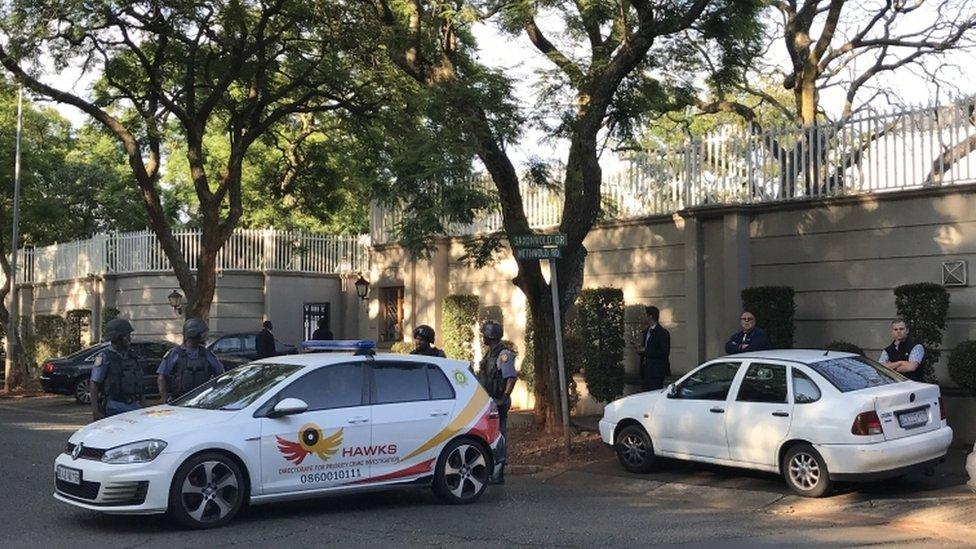
The Gupta family's walled compound in Johannesburg was sealed off during the police raid
The Guptas have been accused of using their close friendship with the president to wield enormous political influence. Both parties deny all allegations of wrongdoing.
Mr Zuma made no reference to the raid when he held a lengthy, unannounced, interview with national broadcaster SABC hours later.
But he said he had done nothing wrong and saw no reason to stand down.
Jacob Zuma's life in seven key dates
April 1942: Born into poverty in northern KwaZulu-Natal, he is raised by his widowed mother and receives no formal schooling
1959: Joins the ANC. He becomes an active member of its military wing in 1962
August 1963: Aged 21, he is convicted of conspiring to overthrow the apartheid government and imprisoned on Robben Island, alongside Nelson Mandela, for 10 years
March 1990: After a period in exile, he returns to South Africa when a ban on the ANC is lifted - he is elected to chair the party four years later
June 1999: Five years after apartheid ends, he becomes deputy president of South Africa - he loses the position in 2005 after being implicated in a fraud trial
April 2009: Two weeks after corruption charges are dropped, Mr Zuma becomes president of South Africa
October 2017: The Supreme Court of Appeal rules he must face 18 counts of corruption, fraud, racketeering and money laundering
What happens next?
Who is Cyril Ramaphosa?
As deputy president, as well as ANC leader, Mr Ramaphosa is likely to step in. The BBC's Andrew Harding says he is expected to be sworn in later on Thursday.
But it is possible that he would not seek to remain as president, preferring to get his own mandate at next year's presidential elections.
The ANC, as the party in government, would then nominate a candidate to serve until then, and parliament would take a vote within 30 days.
Mr Ramaphosa was already the overwhelming favourite to win the 2019 election, one which Mr Zuma was barred from competing in, having served two terms.
Andrew Harding reports on allegations of high-level corruption in South Africa involving a British PR company
- Published14 February 2018
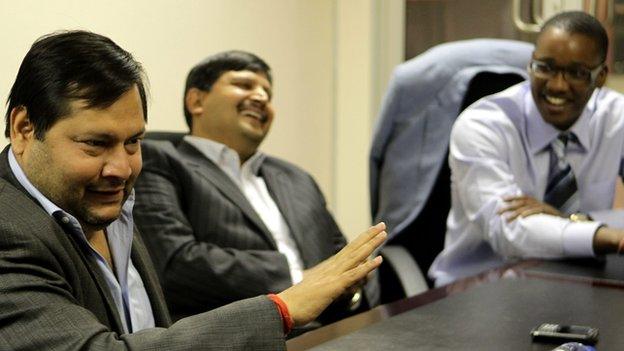
- Published14 February 2018
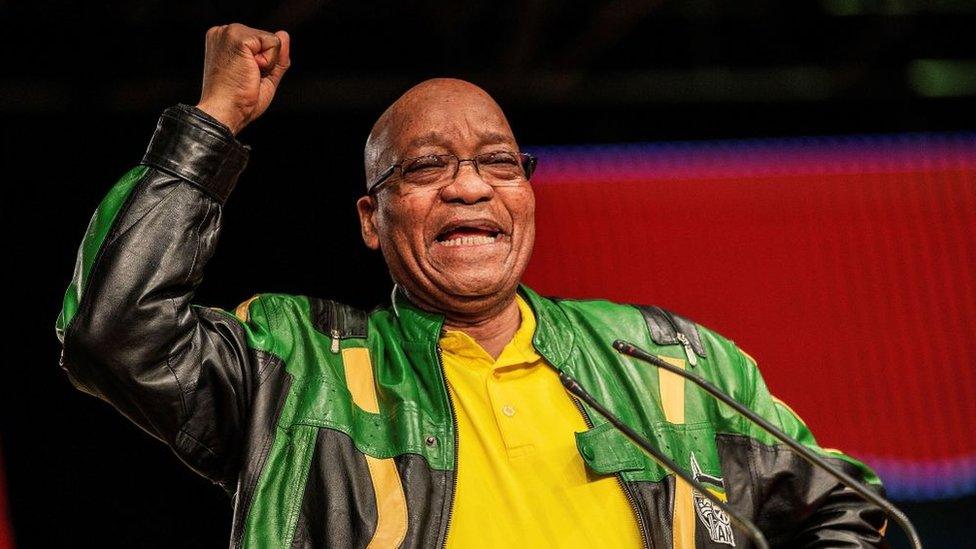
- Published6 April 2018
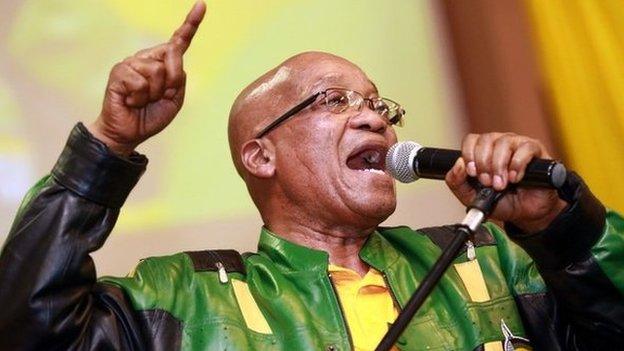
- Published17 June 2024
